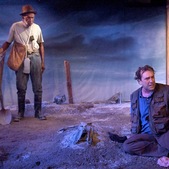HOME PAGE
SITE GUIDE
SEARCH
ADVERTISING AT CURTAINUP
REVIEWS
FEATURES
NEWS
Etcetera and
Short Term Listings
LISTINGS
Broadway
Off-Broadway
NYC Restaurants
BOOKS and CDs
OTHER PLACES
Berkshires
London
California
New Jersey
Philadelphia
Elsewhere
QUOTES
TKTS
PLAYWRIGHTS' ALBUMS
LETTERS TO EDITOR
FILM
LINKS
MISCELLANEOUS
Free Updates
Masthead
Writing for Us
A CurtainUp Los Angeles Review
The Train Driver
| I claim her.— Roelf
|

Adolphus Ward and Morlan Higgins
Photo by Ed Krieger. |
Mr. Fugard wasn't there for opening night, having left for London that day to supervise The Train Driver's debut there. But tout LA turned out for the premiere of this 90-minute piece, based on a newspaper item Fugard saw nearly a decade ago.
In his imagaination, Fugard turned the material around to view the incident through the eyes of the train driver, Roelf (Morlan Higgins). Roelf comes to the graveyard of a squatter camp near Port Elizabeth, South Africa (Fugard's home town) to find the grave of a woman and her baby who have appeared suddenly on the train tracks in front of his engine and ended up pulverized beneath it. Here he encounters the gravedigger, an old black man Simon (Adolphus Ward), who suspiciously and reluctantly listens to his wandering rants
Roelf veers from rage to acceptance as the play digs deeper into the South African psyche. He represents the helpless South African going along until something suddenly shocks him and captures his attention. His first reaction is anger. He's traumatized. He talks to his wife Lorraine, then a counselor and listens numbly as they say all the right things without understanding any of it. He keeps busy Christmas shopping with his wife. The two children trim the Christmas tree.
Nightmares waken Roelf and finally he sleeps in the living room where, one night, in a fit of helpless rage, he destroys the tree. That begins his search for the nameless woman which has brought him to the cemetery. Finally he accepts her with " I claim her" —not in a sexual way but in that final moment when their eyes met, deep in his heart.
Simon, shocked, speaks gently of the need to bury her and then go home. This moment of wisdom and perception on Simon's part personifies black South Africa's view. Roelf accepts and, when Simon wakes in the middle of the night, he finds Roelf outside digging the grave. He calls to him but Roelf goes on with his digging. The play climaxes with tragedy, terror and Fugard's unique ironic twist.
As Roelf, Morlan Higgins ranges from rage through confusion to peace at the last. It's a shattering performance and Higgins holds the stage with a desperate grip that widens into illumination. Adolphus Ward's wide-eyed stare adds a touch of humor to the production and, though he's short on words, what there are are choice. He's never short on a concentrated attention to the other man and, at the end, he knows what he has to do.
Jeff McLaughlin's set design includes the sandy waste of the cemetery and Simon's hovel to which warm tones give a touch of home. It's beautiful, as is Ken Booth's perceptive way with lighting.
The uncredited vocal music was lovely and Stephen Sachs directs with a keen ear for the playwrights's depth and humor. Most of all, the 78-year-old playwright has showed the white man's terror and, despite its length and some repetiousness, another searing picture of South Africa today. It's the best thing he's done so far.
|
The Train Driver Playwright: Athol Fugare Director: Stephen Sachs Cast: Roelf (Morlan Higgins), Simon (Adolphus Ward). Set Design: Jeff McLaughlin Lighting Design: Ken Booth Costume Design: Dana Rebecca Woods ' Sound Design: David B. Marline Technical Director: Scott Tuomey Production Stage Manager: Elna Kordijan Running Time: 90 minutes, no intermission Running Dates: October 16-December 12. Where: The Fountain Theatre, 5060 Fountain Avenue, Los Angeles. Reservations: (323) 663-1525. Reviewed by Laura Hitchcock on October 16. |
|
Subscribe to our FREE email updates with a note from editor Elyse Sommer about additions to the website -- with main page hot links to the latest features posted at our numerous locations. To subscribe,
E-mail:  esommer@curtainup.comesommer@curtainup.com esommer@curtainup.comesommer@curtainup.comput SUBSCRIBE CURTAINUP EMAIL UPDATE in the subject line and your full name and email address in the body of the message -- if you can spare a minute, tell us how you came to CurtainUp and from what part of the country. Visit Curtainup's Blog Annex For a feed to reviews and features as they are posted add http://curtainupnewlinks.blogspot.com to your reader Curtainup at Facebook . . . Curtainup at Twitter REVIEW FEEDBACK Highlight one of the responses below and click "copy" or"CTRL+C"
Paste the highlighted text into the subject line (CTRL+ V): Feel free to add detailed comments in the body of the email. . .also the names and emails of any friends to whom you'd like us to forward a copy of this review. |



